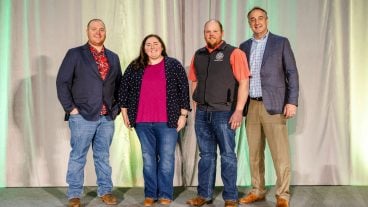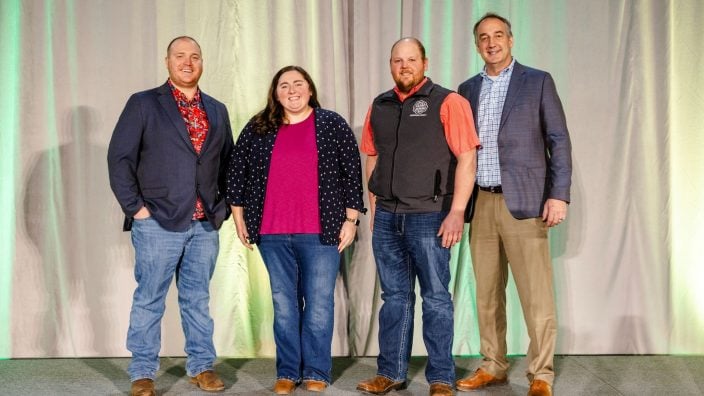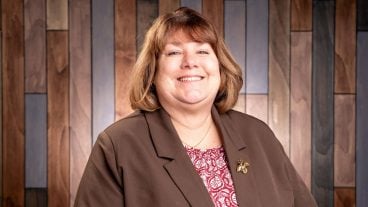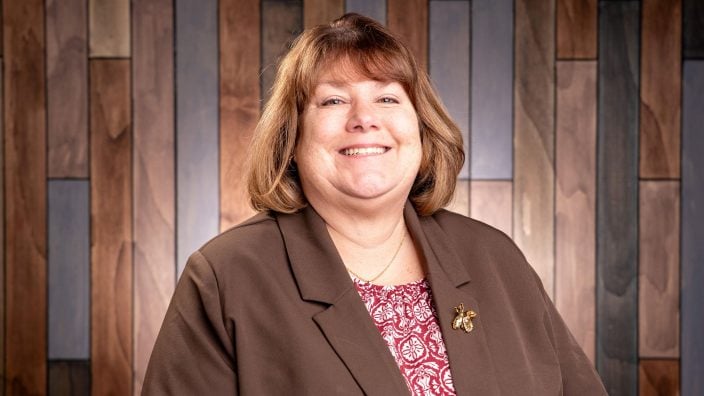Applications for Ohio Farm Bureau Health Plans now available
Members have three ways to apply: contacting a certified agent, calling 833-468-4280 or visiting ohiofarmbureauhealthplans.org.
Read MoreWhen the Farmers for a Sustainable Future coalition started looking at publicly available data on agricultural production and its role in the environment, what it found was “a pretty amazing story,” said Andrew Walmsley, American Farm Bureau Federation director of congressional relations, during a September briefing with the Ohio Farm Bureau policy development committee.
Since 1948, U.S. farmers have been able to increase their output by more than 270%, while inputs have remained relatively flat, he said. “We’re producing more while using about the same, or less, resources that we did several generations ago. That’s a pretty incredible story.”
In fact, U.S. agriculture would have needed nearly 100 million more acres in 1990 to match 2018 production levels. And the use of ethanol and biodiesel in 2018 reduced greenhouse gas emissions by an amount equivalent to taking 17 million cars off the road.
“We should be more comfortable with talking about and spreading the message about what we have been doing in ag, while recognizing there might be room for improvement and more we can do,” Walmsley said.
These conversations are increasingly taking place under the umbrella of climate change, a topic that makes some farmers uncomfortable. But they shouldn’t be.
“We have a lot of questions, but the space is moving forward,” said Jack Irvin, Ohio Farm Bureau’s senior director of state and national policy. “Do we want to be part of the conversation or do we want to be contrarian?”
With strides farmers have been taking to reduce their carbon footprint, overall greenhouse gas emissions are under 10% for the industry. In fact, of overall GHG emissions in the U.S., according to U.S. EPA figures, agriculture comes in at 659 mmt (million metric tons), well below transportation, electricity generation, and industry sectors.
If overall land use and forestry are included, agriculture would actually be a net sink for carbon, not a contributor to emissions, Walmsley said.
The Farmers for a Sustainable Future coalition includes major crop and livestock commodity groups, as well as broad agricultural organizations like the American Farm Bureau Federation and the National Farmers Union. It advocates for voluntary, incentive- and science-based conservation programs that improve environmental sustainability as well as individual farm profitability. It’s also working to make sure any policy debate will recognize farmers’ contributions, efficiency gains and the impact of their carbon sequestration efforts.
“We want to continue to incentivize innovation,” Walmsley said.
“At the end of the day, when we talk about sustainability, we’re talking about economic viability. If we’re not profitable, we’re not going to be able to continue on to the next generation — or potentially the next growing season.”
Learn more at SustainableFarming.us.


Members have three ways to apply: contacting a certified agent, calling 833-468-4280 or visiting ohiofarmbureauhealthplans.org.
Read More

Legacy nutrient deductions enable new farmland owners to claim deductions on the nutrients within the soil on which healthy crops depend.
Read More

Farmers, agribusinesses and community members are encouraged to nominate their local fire departments for Nationwide’s Nominate Your Fire Department Contest through April 30.
Read More

Introduced by Sen. Paula Hicks-Hudson, SB 120 would establish the Urban Farmer Youth Initiative Pilot Program.
Read More

Gases, vapors, and fumes can all create risk. How can we measure and protect ourselves from them?
Read More

The Ohio Farm Bureau’s Young Agricultural Professionals State Committee has named its 2026 leadership and the individuals who will be serving on the state committee for 2026-2028.
Read More

The Ohio Farm Bureau Foundation has multiple scholarships available to Ohio students from rural, suburban and urban communities who are pursuing degrees with a connection to the agricultural industry.
Read More

With 100% bonus depreciation now permanent, farmers can deduct the full cost of a new agricultural building in the year it’s placed in service.
Read More

Lincoln Deitrick was named the Outstanding Young Farmer, Denver Davis won the Excellence in Agriculture Award, and Margaret Houts won the Discussion Meet.
Read More

Michelle Downing of Franklin County has been named finance director of county operations for Ohio Farm Bureau.
Read More